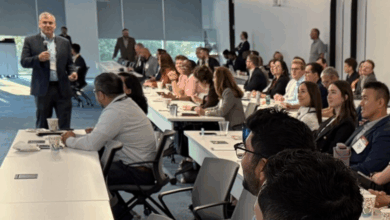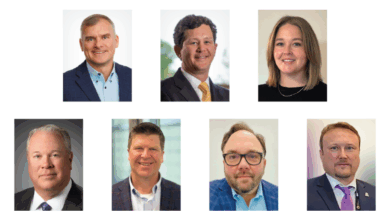A.J. Guiteau, Diamond Offshore: Believe in the value of training, provide quality learning
By Linda Hsieh, assistant managing editor
A.J. Guiteau doesn’t know why, but he’s always liked education. He liked going to school and learning, so much that he earned an adult education degree from the College of Santa Fe in 1969 and then went back to high school as a teacher.
But being a high school teacher didn’t turn out quite “satisfying” enough, so he took a break, returned to his hometown of New Orleans, La., and worked in the construction business. It wasn’t long before he realized that “residential construction wasn’t it.”
In 1976, he heard about “a fledgling company” called Odeco, which “had a good reputation in New Orleans as a company that was growing,” he recalled.
It was a tough time in the business in 1976. So when Mr Guiteau, now corporate manager for training and development for Diamond Offshore, heard about an opening with Odeco in its claims department, he decided to take it. “It was a difficult side of the business,” and he was shocked by the severity of the injuries he saw.
However, investigating rig incidents did clue him in on “why people get injured, and frequently it was because of missing or poor training, or they didn’t act on what they learned.”
So in 1978, wanting to make more contributions to the company and the industry, Mr Guiteau moved to Odeco’s training department.
Over the years, the company aggressively pursued several major training initiatives that included designing and building the world’s first stability simulator that mimics the actual movements of a floating rig. To this day, the simulator continues to be used by Diamond to train its employees in stability and ballast control.
“The industry has made giant strides in the 30 years I’ve been in it – not because I’ve been in it but because of initiatives companies took upon themselves to improve,” he said. But it is because Mr Guiteau has been in the industry – him and thousands of others like him who are dedicated to improving safety and training – that it’s come so far.
In the early ’90s, Mr Guiteau served as chairman of the IADC Well Control Committee and led the group’s efforts to create and develop WellCAP. “It was a long process at first, but I think WellCAP has been a great training standard that is now recognized globally,” he said.
The next generation
The industry knows the “Big Crew Change” has already begun, and preparing for it in the midst of soaring rig activities hasn’t been easy, Mr Guiteau remarked. One program Diamond has implemented to help that process go more smoothly has been its Worldwide Competency Program. It’s a training and assessment system based on the electronic interfacing of 22 worldwide training and licensing matrices. If an employee is leaving a Gulf of Mexico rig to work offshore Indonesia, the program will clearly outline every requirement necessary to help him become “competent” for that area.
Mentoring programs have also been critical as Diamond, like many other contractors, deals with an influx of young, inexperienced personnel. “In some ways it’s easier to train them in safe operational practice rather than some of the older hands who may have some bad habits,” he noted. “However, today’s young people are so electronically tuned, they think they can do any job because they can find any answer in a computer, and that just information will get them through any problem.
“I’m seeing less respect for gaining experience. Younger employees are being promoted so quickly today due to the critical shortage of a qualified workforce, they are running the risk of becoming less effective in the future from missing critical learning experiences.”
Pairing young workers with experienced ones has been especially beneficial in that respect and can help them to “form good attitudes about developing safe and productive operational practices,” he said.
Mr Guiteau pointed to two mentors he’s had in his own career who have taught him valuable life lessons: Lynn Charles, Diamond vice president of human resources, and Moe Plaisance, Diamond vice president of international operations. “Lynn looks at the value of training in terms of development for the whole organization, and he supports innovative training, pilot programs, new technologies and reshaping learning approaches,” he said. “And Moe really represents what I saw in the drilling business early on that I liked. He’s honest, straightforward and encourages everyone to work together. He’s my best model for how things need to get done.”
The future
In 10 years, experience levels within the industry will be much lower than they are now, Mr Guiteau said, and it’s extremely critical to get young workers trained well from the beginning. “We know we have a different generation of people coming in now, so our focus on core, safe drilling practices will have to be much stronger. We have guys who don’t know the risks, and increasing technology and logistics are driving us to a challenging new era. I think the exposure is greater now, but industry commitment to manage this in a safe and productive manner through proper training has never been greater.”





I am trying to apply for the position of a Roustabout. My main skills for this job are I am hard working, honest and keen to progress. I am a good team player and I can also be trusted to work on my own. I am of very good health. I am self motivated, with great interpersonal skills.I am just looking for a chance to succeed. If there is anything you can do, or any advice you could give me it would be greatly appreciated.
Thanks Keyond
#323-710-7507
Hm# 323-292-1420